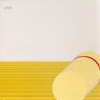Asmus Tietchens, "Litia"
This marks the fifth in Die Stadt's ongoing Tietchens reissue campaignand the last of the artist's early works to be released initially bySky Records. The sound is similar to the previous Sky discs and closestto the best of the five, Biotop and Spät Europa.Die Stadt
 Tietchens is again working within the pop format to produce warped,retro-futurist jingles from an intimidating collection of antiquesynthesizers, but here, as on Spät and its successor In Die Nacht,he toys more and more with the a-melodic fragments and jagged, sinisterrhythm tracks of a developing industrial personality. The mood is stillall fun, but for the first time Tietchens seems involved in creating amystery, allowing the pop context to assert itself only for reasons ofparody. Rhythm remains flat and static throughout, the music's tune-fulelements accomplishing little more than a program of retarded waltzes,coated in plastic echo and hideously pixilated accents. Songs areshort, but feel long, drawn into a distant nocturnal sprawl,de-energized by the metallic flavor of the sounds and their explicitlymechanical construction. Though criticized for exposing a fusion of theartist's interests too uneven to be enjoyable, Litia soundstoday like an odd voice of dissent, dark and harsh enough to reject thepop perspective, yet immediate beyond the visceral associations ofindustrial music. A punk sensibility enters, encouraged by Tietchens'reliable deadpan presentation, lending the album some of itspredecessors' light-heartedness without a sacrifice in the coldexactitude of the music. New comparisons might include the more lo-fiwork of Flux Information Sciences whose own brand of cut-up,industrialized pop reaches a similar apex of plasticity, self-parody,and gritty self-indulgence. And while the music simply does not achievethe same addictive quality of Biotop or Spät, the Litia reissue attaches more bonus material than any before it, including Rattenheu,a 10" from the same sessions. Without the stifling rhythmic linearityof album tracks, these become some of highlights of the reissue,sounding much less dated (not surprising, as the 10" was released in1996, years after the 1983 recording), similar to the looserpop-oriented late 90s work Tietchens did with the Hematic Sunsets andthe Scorpions.
Tietchens is again working within the pop format to produce warped,retro-futurist jingles from an intimidating collection of antiquesynthesizers, but here, as on Spät and its successor In Die Nacht,he toys more and more with the a-melodic fragments and jagged, sinisterrhythm tracks of a developing industrial personality. The mood is stillall fun, but for the first time Tietchens seems involved in creating amystery, allowing the pop context to assert itself only for reasons ofparody. Rhythm remains flat and static throughout, the music's tune-fulelements accomplishing little more than a program of retarded waltzes,coated in plastic echo and hideously pixilated accents. Songs areshort, but feel long, drawn into a distant nocturnal sprawl,de-energized by the metallic flavor of the sounds and their explicitlymechanical construction. Though criticized for exposing a fusion of theartist's interests too uneven to be enjoyable, Litia soundstoday like an odd voice of dissent, dark and harsh enough to reject thepop perspective, yet immediate beyond the visceral associations ofindustrial music. A punk sensibility enters, encouraged by Tietchens'reliable deadpan presentation, lending the album some of itspredecessors' light-heartedness without a sacrifice in the coldexactitude of the music. New comparisons might include the more lo-fiwork of Flux Information Sciences whose own brand of cut-up,industrialized pop reaches a similar apex of plasticity, self-parody,and gritty self-indulgence. And while the music simply does not achievethe same addictive quality of Biotop or Spät, the Litia reissue attaches more bonus material than any before it, including Rattenheu,a 10" from the same sessions. Without the stifling rhythmic linearityof album tracks, these become some of highlights of the reissue,sounding much less dated (not surprising, as the 10" was released in1996, years after the 1983 recording), similar to the looserpop-oriented late 90s work Tietchens did with the Hematic Sunsets andthe Scorpions.
 Tietchens is again working within the pop format to produce warped,retro-futurist jingles from an intimidating collection of antiquesynthesizers, but here, as on Spät and its successor In Die Nacht,he toys more and more with the a-melodic fragments and jagged, sinisterrhythm tracks of a developing industrial personality. The mood is stillall fun, but for the first time Tietchens seems involved in creating amystery, allowing the pop context to assert itself only for reasons ofparody. Rhythm remains flat and static throughout, the music's tune-fulelements accomplishing little more than a program of retarded waltzes,coated in plastic echo and hideously pixilated accents. Songs areshort, but feel long, drawn into a distant nocturnal sprawl,de-energized by the metallic flavor of the sounds and their explicitlymechanical construction. Though criticized for exposing a fusion of theartist's interests too uneven to be enjoyable, Litia soundstoday like an odd voice of dissent, dark and harsh enough to reject thepop perspective, yet immediate beyond the visceral associations ofindustrial music. A punk sensibility enters, encouraged by Tietchens'reliable deadpan presentation, lending the album some of itspredecessors' light-heartedness without a sacrifice in the coldexactitude of the music. New comparisons might include the more lo-fiwork of Flux Information Sciences whose own brand of cut-up,industrialized pop reaches a similar apex of plasticity, self-parody,and gritty self-indulgence. And while the music simply does not achievethe same addictive quality of Biotop or Spät, the Litia reissue attaches more bonus material than any before it, including Rattenheu,a 10" from the same sessions. Without the stifling rhythmic linearityof album tracks, these become some of highlights of the reissue,sounding much less dated (not surprising, as the 10" was released in1996, years after the 1983 recording), similar to the looserpop-oriented late 90s work Tietchens did with the Hematic Sunsets andthe Scorpions.
Tietchens is again working within the pop format to produce warped,retro-futurist jingles from an intimidating collection of antiquesynthesizers, but here, as on Spät and its successor In Die Nacht,he toys more and more with the a-melodic fragments and jagged, sinisterrhythm tracks of a developing industrial personality. The mood is stillall fun, but for the first time Tietchens seems involved in creating amystery, allowing the pop context to assert itself only for reasons ofparody. Rhythm remains flat and static throughout, the music's tune-fulelements accomplishing little more than a program of retarded waltzes,coated in plastic echo and hideously pixilated accents. Songs areshort, but feel long, drawn into a distant nocturnal sprawl,de-energized by the metallic flavor of the sounds and their explicitlymechanical construction. Though criticized for exposing a fusion of theartist's interests too uneven to be enjoyable, Litia soundstoday like an odd voice of dissent, dark and harsh enough to reject thepop perspective, yet immediate beyond the visceral associations ofindustrial music. A punk sensibility enters, encouraged by Tietchens'reliable deadpan presentation, lending the album some of itspredecessors' light-heartedness without a sacrifice in the coldexactitude of the music. New comparisons might include the more lo-fiwork of Flux Information Sciences whose own brand of cut-up,industrialized pop reaches a similar apex of plasticity, self-parody,and gritty self-indulgence. And while the music simply does not achievethe same addictive quality of Biotop or Spät, the Litia reissue attaches more bonus material than any before it, including Rattenheu,a 10" from the same sessions. Without the stifling rhythmic linearityof album tracks, these become some of highlights of the reissue,sounding much less dated (not surprising, as the 10" was released in1996, years after the 1983 recording), similar to the looserpop-oriented late 90s work Tietchens did with the Hematic Sunsets andthe Scorpions.


